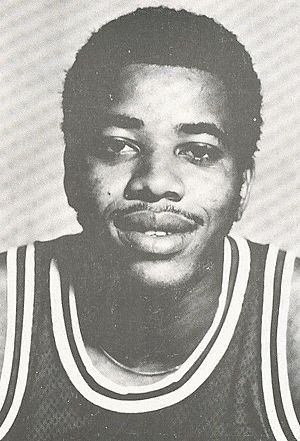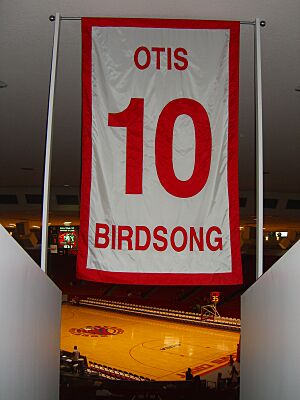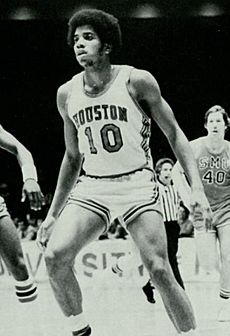Otis Birdsong facts for kids

Birdsong in 1978
|
||||||||||||||
| Personal information | ||||||||||||||
|---|---|---|---|---|---|---|---|---|---|---|---|---|---|---|
| Born | December 9, 1955 Winter Haven, Florida, U.S. |
|||||||||||||
| High school | Winter Haven (Winter Haven, Florida) |
|||||||||||||
| Listed height | 6 ft 3 in (1.91 m) | |||||||||||||
| Listed weight | 190 lb (86 kg) | |||||||||||||
| Career information | ||||||||||||||
| College | Houston (1973–1977) | |||||||||||||
| NBA Draft | 1977 / Round: 1 / Pick: 2nd overall | |||||||||||||
| Selected by the Kansas City Kings | ||||||||||||||
| Pro career | 1977–1990 | |||||||||||||
| Career history | ||||||||||||||
| 1977–1981 | Kansas City Kings | |||||||||||||
| 1981–1988 | New Jersey Nets | |||||||||||||
| 1988–1990 | Tulsa Fast Breakers | |||||||||||||
| 1989 | Boston Celtics | |||||||||||||
| Career highlights and awards | ||||||||||||||
|
||||||||||||||
| Career NBA statistics | ||||||||||||||
| Points | 12,544 (18.0 ppg) | |||||||||||||
| Rebounds | 2,072 (3.0 rpg) | |||||||||||||
| Assists | 2,260 (3.2 apg) | |||||||||||||
|
Medals
|
||||||||||||||
Otis Lee Birdsong (born December 9, 1955) is a former professional basketball player from the United States. He played for twelve seasons in the National Basketball Association (NBA). During his career, he was chosen to play in four NBA All-Star Games.
Otis was a 6 ft 3 in (1.91 m) guard. He went to Winter Haven High School and the University of Houston. In 1977, the Kansas City Kings picked him second overall in the 1977 NBA draft. He played four seasons with the Kings. In the 1980–81 NBA season, he scored a career-high 24.6 points per game. He also played seven seasons with the New Jersey Nets and one with the Boston Celtics. He finished his NBA career in 1989.
Contents
College Basketball Career

When Otis Birdsong was a freshman in college, he was one of the top scorers on his team. He averaged 14.3 points per game. The next year, as a sophomore, he made history at the University of Houston. He was the first sophomore to score 1,000 points in his college career.
When his team, the Houston Cougars, joined the Southwest Conference, Otis became a star scorer. In his first year in the conference, he led everyone in scoring. He was eighth in the country with an average of 26.1 points per game.
In 1977, Otis was named a top All-American. He was also named the Southwest Conference Men's Basketball Player of the Year. That year, he led the Houston Cougars to a great 29–8 record. They even made it to the championship game of the National Invitational Tournament. They played against St. Bonaventure. Otis scored 38 points in that game, but Houston lost. He was fourth in the nation for scoring, with 30.3 points per game. Because of his amazing skills, he was named the Southwest Conference Player of the Decade.
Otis was also chosen for the All-Southwest Conference team in 1976 and 1977. He was named District VI Player of the Year. This award covered players from Texas, Oklahoma, and Arkansas. He was also on the All-District VI Team for three years. He was the team captain during his junior and senior years.
During his four years with the Cougars, the team won 79 games and lost 38. When he left the University of Houston, he was the school's second-highest scorer ever. He had 2,832 total college points.
Otis also ranks high in other areas for Houston. He is second in field goals and third in steals. He is sixth in assists and ninth in field goal percentages. He still holds the school record for free throws, with 480 made.
Professional Basketball Career
After his college career, Otis Birdsong was the second player picked in the 1977 NBA draft. The Kansas City Kings chose him.
On January 28, 1979, Otis had a great game. He made 11 assists and scored 30 points. This helped the Kings win against the Cleveland Cavaliers. A year later, on January 29, 1980, he scored a career-high 49 points. He made 20 out of 25 shots in a win against the Denver Nuggets.
During the 1980-81 NBA season, Otis had his best scoring year. He averaged 24.6 points per game. He helped the Kings make a surprising run in the playoffs. They reached the Western Conference Finals. In the first round, Otis averaged 27 points, 6 assists, and 4 rebounds. They beat the Portland Trail Blazers.
However, in the second game of the next round, Otis got a bad ankle injury. Even without him and another injured player, the Kings still won their series against the Phoenix Suns. But in the Western Conference Finals, their amazing playoff run ended. They lost to the Moses Malone-led Houston Rockets.
On June 8, 1981, the Kansas City Kings traded Otis to the New Jersey Nets. He played seven seasons with the Nets. His deepest playoff run with the Nets was in 1984. The Nets surprised everyone by beating the defending champions, the Philadelphia 76ers. This team had stars like Moses Malone and Julius Erving. Otis played a team role, scoring 14.4 points per game in that series. However, the Nets then lost to the Milwaukee Bucks.
In total, Otis scored over 12,000 points in his NBA career. He averaged 18 points per game over 12 seasons. He played for the Kings, New Jersey Nets, and Boston Celtics. He was chosen for four NBA All-Star Games. In 1981, he was named to the All-NBA Second Team.
After the NBA, Otis played for the Tulsa Fast Breakers. This team was in the Continental Basketball Association (CBA). He played there from 1988 to 1990. He even won a CBA championship with the Fast Breakers in 1989.
After his basketball career, Otis returned to Houston. He worked as part of the radio team for the Cougars for several seasons. Later, he moved to Dallas.
Otis has been honored many times. In 2000, he was inducted into the University of Houston's Hall of Honor. He also joined the Polk County, Florida Hall of Fame. In 2006, he was inducted into the Florida High School Hall of Fame. On October 20, 2014, he was inducted into the Southwest Conference Hall of Fame. This was presented by the Texas Sports Hall of Fame.
NBA Career Statistics
| Legend | |||||
|---|---|---|---|---|---|
| GP | Games played | GS | Games started | MPG | Minutes per game |
| FG% | Field goal percentage | 3P% | 3-point field goal percentage | FT% | Free throw percentage |
| RPG | Rebounds per game | APG | Assists per game | SPG | Steals per game |
| BPG | Blocks per game | PPG | Points per game | Bold | Career high |
Regular Season Stats
| Year | Team | GP | GS | MPG | FG% | 3P% | FT% | RPG | APG | SPG | BPG | PPG |
|---|---|---|---|---|---|---|---|---|---|---|---|---|
| 1977–78 | Kansas City | 73 | — | 25.7 | .492 | — | .697 | 2.4 | 2.4 | 1.0 | .2 | 15.8 |
| 1978–79 | Kansas City | 82 | — | 34.6 | .509 | — | .725 | 4.3 | 3.4 | 1.5 | .2 | 21.7 |
| 1979–80 | Kansas City | 82 | — | 35.2 | .505 | .278 | .694 | 4.0 | 2.5 | 1.7 | .3 | 22.7 |
| 1980–81 | Kansas City | 71 | — | 36.5 | .544 | .286 | .697 | 3.6 | 3.3 | 1.3 | .3 | 24.6 |
| 1981–82 | New Jersey | 37 | 22 | 27.7 | .469 | .000 | .583 | 2.6 | 3.4 | .8 | .1 | 14.2 |
| 1982–83 | New Jersey | 62 | 54 | 30.4 | .511 | .333 | .566 | 2.4 | 3.9 | 1.4 | .3 | 15.1 |
| 1983–84 | New Jersey | 69 | 57 | 31.4 | .508 | .250 | .608 | 2.5 | 3.9 | 1.2 | .2 | 19.8 |
| 1984–85 | New Jersey | 56 | 45 | 32.9 | .511 | .190 | .622 | 2.6 | 4.1 | 1.5 | .1 | 20.6 |
| 1985–86 | New Jersey | 77 | 74 | 31.1 | .513 | .364 | .581 | 2.6 | 3.4 | 1.1 | .2 | 15.8 |
| 1986–87 | New Jersey | 7 | 6 | 18.1 | .452 | .000 | .667 | 1.0 | 2.4 | .4 | .0 | 6.3 |
| 1987–88 | New Jersey | 67 | 59 | 28.1 | .458 | .360 | .511 | 2.5 | 3.3 | .8 | .2 | 10.9 |
| 1988–89 | Boston | 13 | 0 | 8.3 | .500 | .333 | .000 | 1.0 | .7 | .2 | .1 | 2.8 |
| Career | 696 | 317 | 31.1 | .506 | .274 | .655 | 3.0 | 3.2 | 1.2 | .2 | 18.0 | |
| All-Star | 4 | 0 | 13.0 | .375 | — | .500 | 1.5 | .5 | .8 | .0 | 3.5 | |
Playoff Stats
| Year | Team | GP | GS | MPG | FG% | 3P% | FT% | RPG | APG | SPG | BPG | PPG |
|---|---|---|---|---|---|---|---|---|---|---|---|---|
| 1979 | Kansas City | 5 | — | 33.6 | .513 | — | .711 | 3.6 | 1.8 | 2.0 | .0 | 21.0 |
| 1980 | Kansas City | 3 | — | 37.6 | .484 | .000 | .429 | 7.7 | 2.3 | 1.3 | .0 | 22.0 |
| 1981 | Kansas City | 8 | — | 29.3 | .571 | 1.000 | .611 | 2.6 | 3.4 | 1.5 | .0 | 15.5 |
| 1983 | New Jersey | 2 | — | 18.5 | .375 | .000 | .500 | 1.0 | 4.5 | 1.5 | .0 | 6.5 |
| 1984 | New Jersey | 11 | — | 35.2 | .415 | .000 | .521 | 2.4 | 3.7 | 1.8 | .1 | 15.2 |
| 1986 | New Jersey | 3 | 3 | 44.0 | .527 | .000 | .579 | 4.0 | 3.3 | 2.0 | 1.0 | 23.0 |
| 1989 | Boston | 3 | 1 | 6.7 | .200 | .000 | — | .7 | .3 | .3 | .3 | .7 |
| Career | 35 | 4 | 31.1 | .480 | .091 | .583 | 3.0 | 3.0 | 1.6 | .1 | 15.6 | |
See also
 In Spanish: Otis Birdsong para niños
In Spanish: Otis Birdsong para niños
 | Delilah Pierce |
 | Gordon Parks |
 | Augusta Savage |
 | Charles Ethan Porter |


